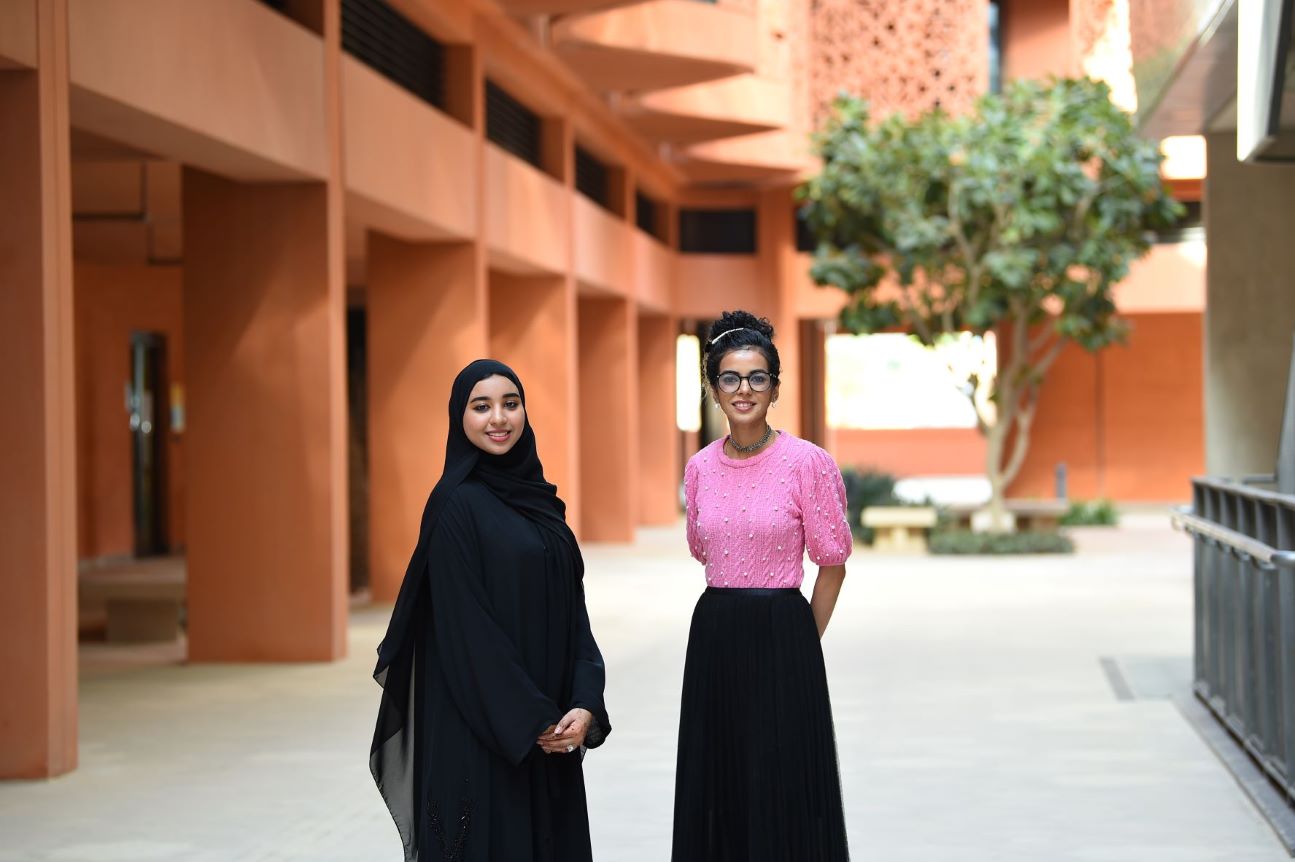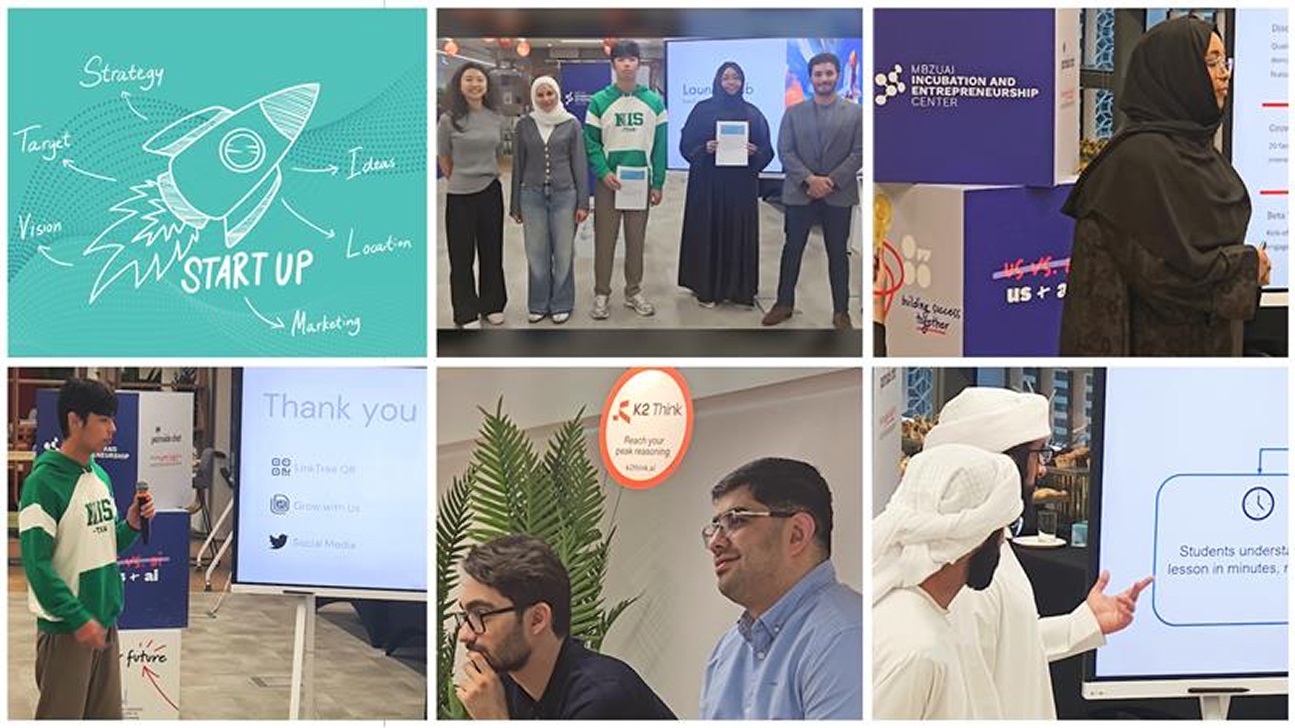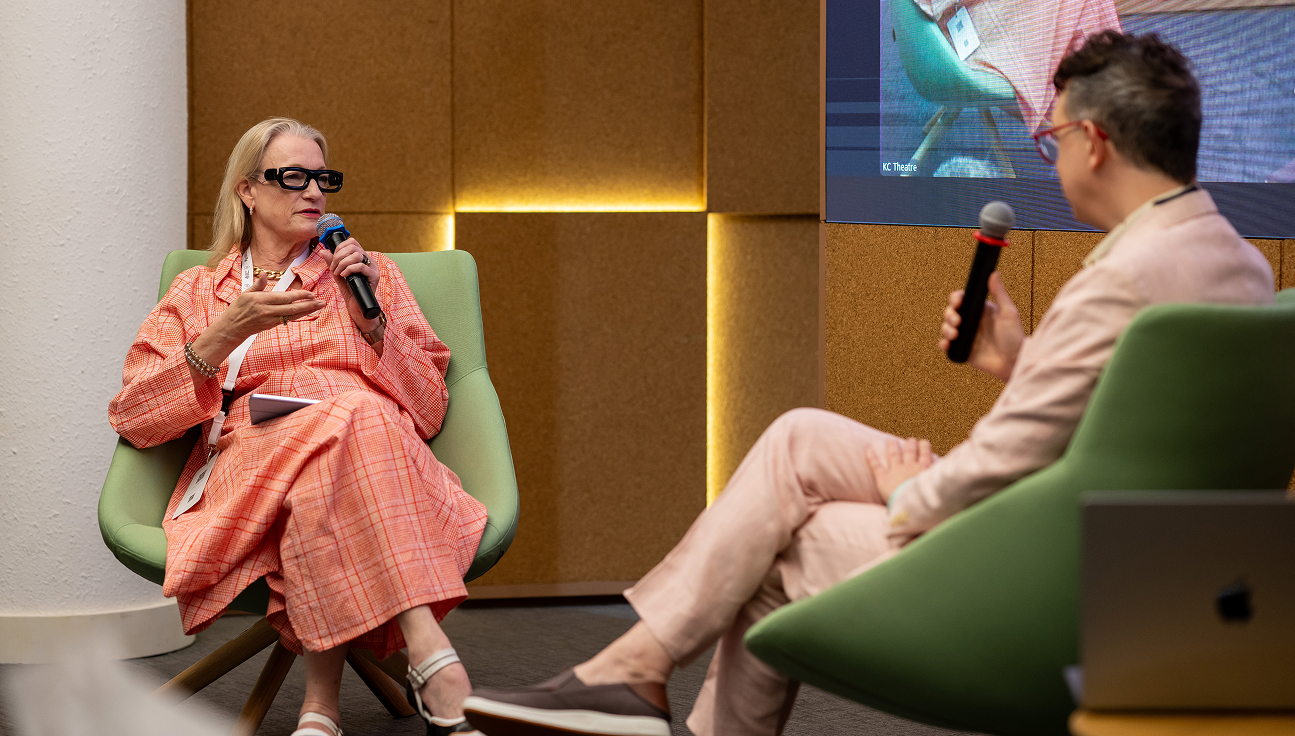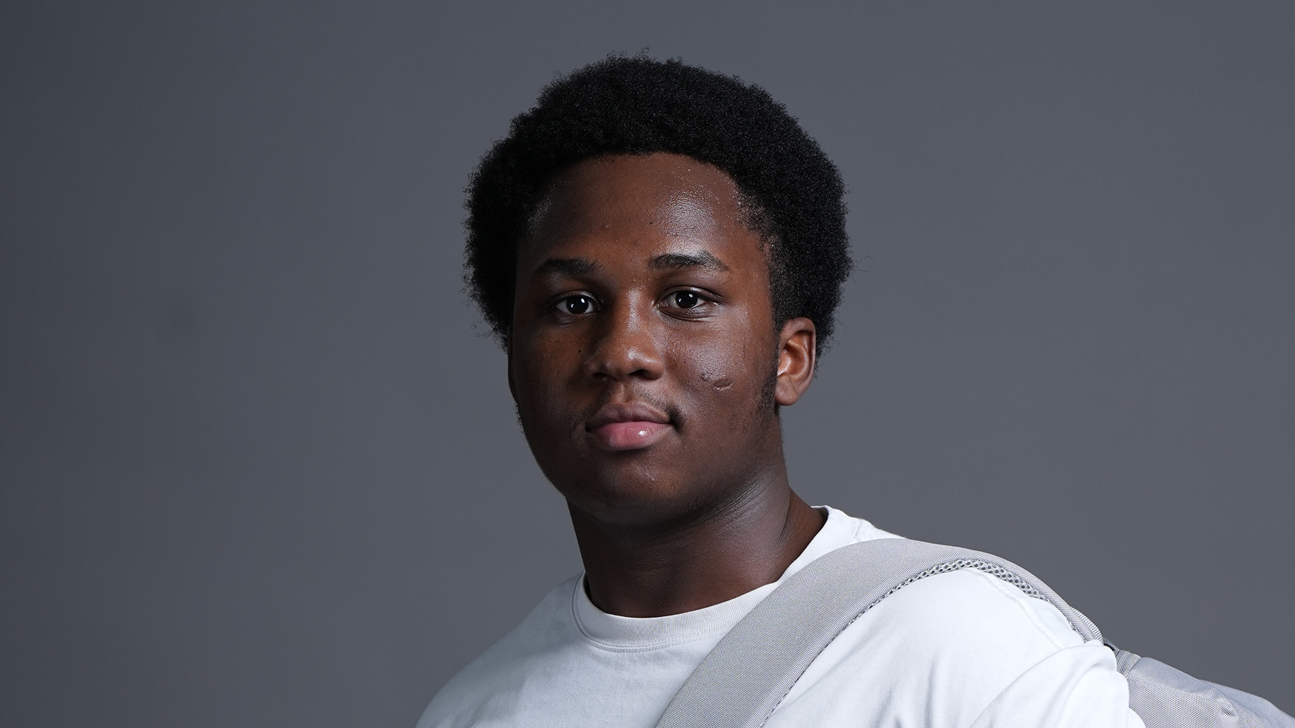A conversation with Women in AI founders
Friday, February 11, 2022

International Day of Women and Girls in Science (February 11, 2022): The Women in AI (WAI) club aims to leverage women’s representation and participation in artificial intelligence at MBZUAI and in the wider UAE. It was founded by two master’s students in machine learning—Asma Hashmi (Pakistan) club president, and Ameera Bawazir (UAE) the vice president.
WAI fosters an environment of empowerment and knowledge for women aspiring to be part of the AI community. It aligns with International Day of Women and Girls in Science which brings together accomplished scientists, global leaders, academics, and trailblazers to celebrate the incredible, diverse contributions of women and girls in science, technology, engineering, and mathematics (STEM).
Globally, women in science have achieved numerical parity (45–55%) at the bachelor’s and master’s levels of study and are on the cusp at Ph.D. level (44%). But according to a 2018 UNESCO report: “women are not benefitting fully from employment opportunities open to highly educated and skilled experts in cutting edge fields such as artificial intelligence where only one in five professionals (22%) is a woman.”
As a new university, MBZUAI hopes to continue to increase its female student body from 31% in its first cohort of students.
Giving women a platform
The gender gap widens as women progress in their academic careers, with lower participation at each successive rung of the ladder from doctoral student to assistant professor to director of research or full professor. MBZUAI has one female professor, Najwa Aaraj, who is someone WAI looks up to and is a big advocate for encouraging more females to enter the technology field.
Despite a shortage of skills in most of the technological fields driving the Fourth Industrial Revolution, women still account for only 28% of engineering graduates and 40% of graduates in computer science and informatics, according to the above mentioned UNESCO report.
WAI hopes to provide a platform for women to showcase their skills in the AI domain, while giving them an opportunity to transfer them to other students. Their activities involve inviting females working in the field of AI to give talks about their journey in STEM fields and provide tips for other aspiring students.
We spoke with Hashmi and Bawazir about their studies, their aspirations for the future, and about starting the MBZUAI chapter of WAI.
What will you do after graduation at the end of the year?
BAWAZIR: I aim to be part of the development of the artificial intelligence domain in the UAE, and I look forward to participating in the industry to deploy my knowledge and skills as a machine learning researcher.
HASHMI: I have still not made up my mind. I have a few options to explore-pursue on creating a start-up, working with a tech company to gain industrial experience in the field to refine my skills, or to pursue higher education and research in the field.
Where did you do your undergraduate?
HASHMI: I did my undergraduate at University of Massachusetts in Boston. I studied mathematics.
BAWAZIR: I did my undergrad at Khalifa University of Science and Technology in Abu Dhabi. My major was applied mathematics and statistics with a concentration in biology.
MBZUAI has a 31% female student population – is this more than you expected when you enrolled? Have you formed lifelong friendships at MBZUAI in your short time here?
HASHMI: This percentage was slightly more than what I expected. If I go by numbers, then only 27 to 30% women make up the workforce in STEM fields; the ratio is the same for the female student body pursuing degrees in STEM subjects. However, of this percentage, women of color make up about only five per cent. I witnessed this during my studies in Boston and while I worked there.
I was surprised in a good way to see such a diverse pool of young women making their mark at MBZUAI. I consider myself blessed to have found a family away from family in Boston when I was there. And I thought you can only get lucky once, I am so utterly grateful that I was proved wrong; I have found another family here at MBZUAI.
BAWAZIR: Prior to joining MBZUAI, I was ambitious about the number of female students I will see on our campus. If I would talk about my experience as a female student studying STEM in UAE, I would say that female students comprise a high percentage in higher education. Therefore, I believe this percentage will increase over the next batches. I feel lucky to have met such distinguished students from different nationalities and cultures. I have made strong friendships with many students through our interactive classes, group projects and extracurricular activities.
How important is it for more women to be involved in STEM?
BAWAZIR: When we omit one gender from participation in one domain, we omit half of the society. This results in biased innovation, technology and slows down of scientific success in the long run. If we talk about AI specifically, as many institutions make decisions based on AI algorithms, women’s involvement in AI is essential to prevent such algorithms from amplifying existing gender stereotypes that unfortunately do exist in our data. Also, to avoid the development of gender biased algorithms that will influence a woman’s economic, social and health security.
HASHMI: The world is witnessing The Fourth Industrial Revolution, which is revolving around a digitally driven future. According to a UNESCO report that came out recently, the advancements in AI technologies will soften the boundaries that are the basis of gender gap between men and women. This makes it pivotal that women are provided with opportunities that allow them access to resources and quality education that will enable them to compete with men on an equal footing. Also, women are driving 85% of the world market.
It wouldn’t be wrong to say that women can easily represent a growth market bigger than both China and India combined! Female consumers are potentially driving the world economy. But how many women are represented in leadership positions in the world economic stage? The number is sadly quite low. If we can build an economy where women are equipped with desired and necessary skill sets and are assimilated into the workforce of the digitally driven economy, then the world would see an escalation in innovations that benefits all.
Did you know you always wanted a career in this field? What made you choose this career path?
HASHMI: No. I wasn’t even aware of this field until my junior year in college when I took a statistical learning course in which we were required to do a small project in machine learning. I found it so beautifully amazing about how AI can be applied to almost any field. This means that there is always an opportunity to continuously learn something new while exploring the potential of this field in a myriad of domains.
BAWAZIR: I have always been fascinated by statistics and the power of data ever since high school. When I graduated, I knew I wanted to work with predictive modeling and data, so I chose to study applied mathematics and statistics. After graduation I interned at IBM in the Data Science Center of Excellence for six months. I had the opportunity to work in so many data science and AI projects. I witnessed how AI can change the way institutions work. From there I knew I wanted to further pursue this field and join MBZUAI as a master’s student in machine learning.
What would you say to other young women thinking of career in STEM or AI?
BAWAZIR: I would like to encourage them to pursue this field not only because women are capable of leading such fields but also because their participation is essential for unbiased development of these fields.
HASHMI: Be courageous; take risks. Don’t aim for perfection. It’s mostly the fear of failing and not being “perfect” that precludes us from trying to reach our true potential. This is something I constantly remind myself and is also a work in progress for me. To women testing their mark in STEM/AI, I would say, follow Steve Jobs’ motto, “Stay hungry. Stay foolish.”
How can we ensure our actions today add to the collective voices on equality and diversity?
HASHMI: We need to think about what are the main drivers that pique women’s interest in STEM subjects. There are a few that come to my mind:
- Encouragement and mentorship
- Visible role models
- Opportunity to gain practical experience
- Changing the way in which we are raising our girls…stop burdening them to become “perfect”
BAWAZIR: Female participation in STEM and AI is one stone that adds to the collective efforts towards ensuring equality and diversity in our societies.
What are you researching and what impact do you hope your research and work has on the world?
BAWAZIR: I work in BioMedIA Lab where it investigates real-world healthcare problems using artificial intelligence. My research focuses on segmenting Covid-19 infection from lung CT scans. CT scans are 3-D medical images that are recommended to help with early diagnosis and detection of the disease. Due to high number of patients, the high cost of imaging labelling and low number of qualified radiologists, an automatic solution becomes essential. We hope that this will help in early prevention and control of virus spread.
HASHMI: My thesis is focused on developing an algorithm or a statistical/probabilistic model that would estimate the ground truth and improve segmentation results in medical imaging. In medical imaging, we face a myriad of issues such as extremely limited data. Furthermore, the data we receive is also noisy as each medical expert uses their own set of biases and expertise to annotate the data. This becomes more acute when we are dealing with more complex diagnosis, for example, tumors and lesions.
We find that there is a lot of disagreement among medical experts about where they think the tumor or lesion is. This disagreement in diagnostics also reflects on the annotations of the medical imaging data. It also raises a concern that since we have noisy data, this means that we don’t have a ground truth (what we perceive as correct labels) to use to train our machine learning models. Training on noisy data inhibits the performance of our machine learning algorithms.
What is your role in Women in AI committee and how did it come about?
HASHMI: I am the president of the WAI club. It was founded to celebrate women pursuing studies and careers in AI, to share their journeys to inspire their peers, and as well as a platform where we can discuss the challenges we are facing in the field. We hold technical workshops to transfer skills to learn from each other.
BAWAZIR: I’m the vice president of the WAI club, where we plan, strategize, and organize events that help to empower, motivate, and inspire females in our campus. The motivation comes from the realization of low female representation in our campus in faculty and research positions. Hence, we aim to inspire more females to be confident enough to believe in their skillsets and knowledge to reach to leadership positions.
You can contact WAI at wai@mbzuai.ac.ae
- student achievements ,
- student life ,
- healthcare ,
- women in AI ,
- biomedical ,
- STEM ,
- statistics ,
- mathematics ,
Related
MBZUAI's Launch Lab equips alumni and students with practical startup tools
The six-week pilot program brought alumni and students together to turn early startup ideas into tangible ventures.
- alumni relations ,
- launch lab ,
- startups ,
- alumni ,
- entrepreneurship ,
Designing the human side of AI
MBZUAI’s inaugural HCI Symposium explored how people will live and work alongside AI, and how to ensure.....
Read MoreYoungest MBZUAI student sets sights on AI superintelligence at just 17
Brandon Adebayo joined the University’s inaugural undergraduate cohort, driven by a passion for reasoning, research, and the.....
- Undergraduate ,
- student ,
- engineering ,


